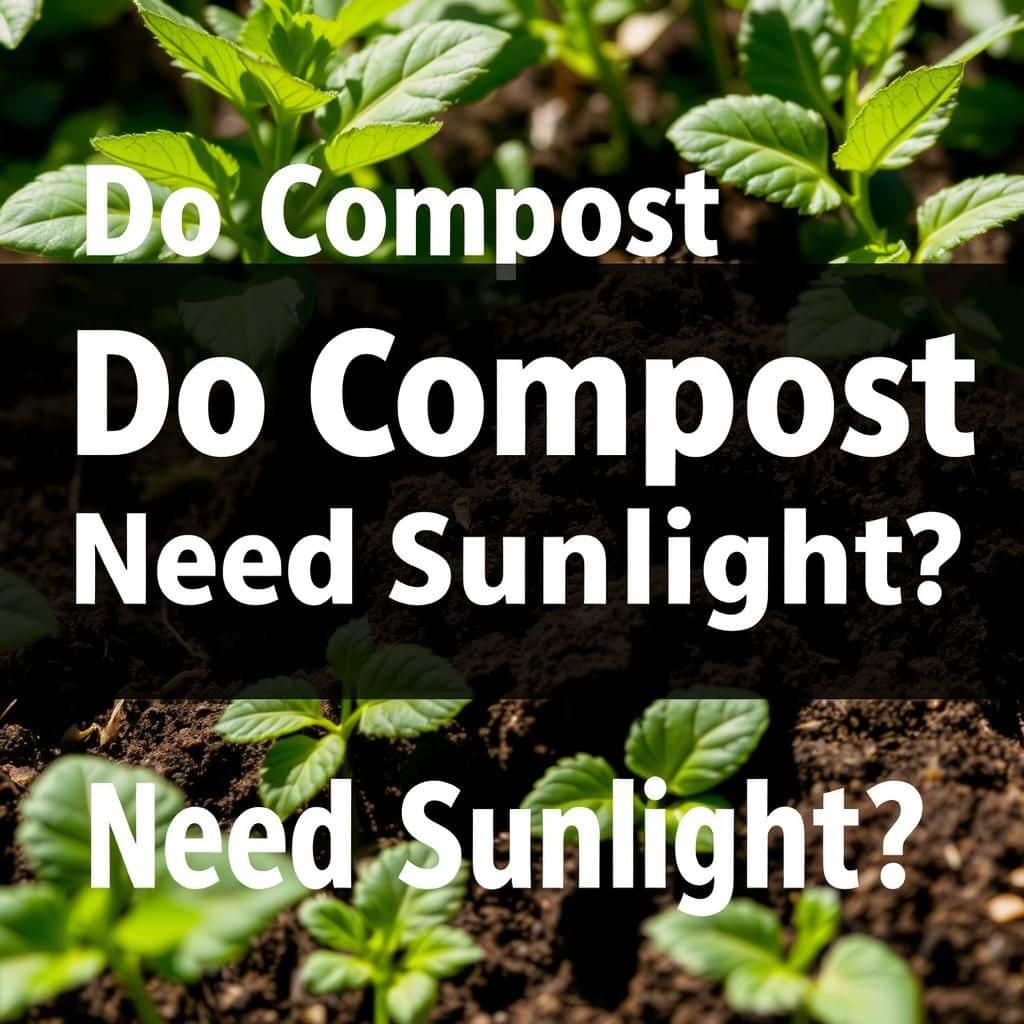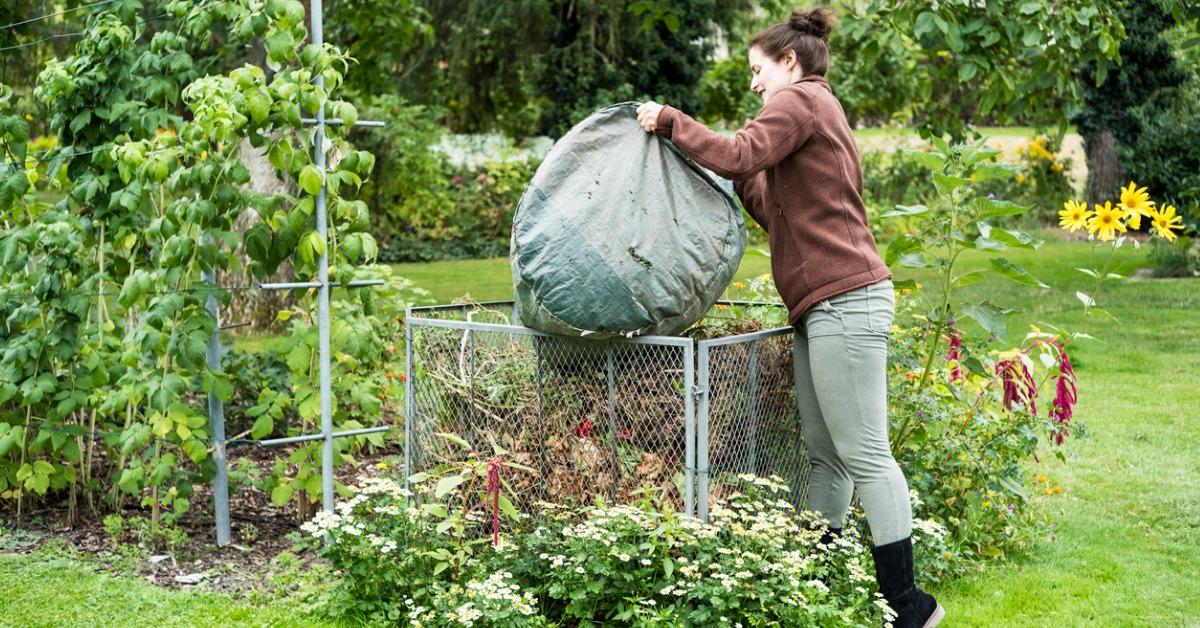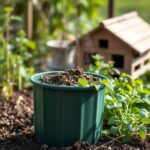Do Compost Need Sunlight? Understanding the Importance of Sun Exposure in Composting

Composting is an eco-friendly method of recycling organic waste, transforming it into nutrient-rich soil. One common question among composting enthusiasts is whether compost needs sunlight to thrive. Understanding the role of sun exposure in the composting process is essential for achieving optimal results. Sunlight can affect the temperature, moisture levels, and microbial activity within the compost pile. This article delves into the intricacies of sunlight's impact on composting, exploring how to balance sun exposure to enhance decomposition while preventing issues like overheating or drying out. Whether you're a novice or a seasoned composter, this knowledge will help you improve your composting practices.
Do Compost Need Sunlight?
Compost does not require sunlight to decompose effectively, as the primary drivers of the composting process are microorganisms, moisture, and oxygen. Instead of needing sunlight, compost thrives in a balanced environment where aerobic bacteria and fungi can break down organic matter. Excessive sunlight and heat can actually lead to the drying out of the compost pile, reducing microbial activity and slowing down the decomposition process. Therefore, placing compost in a shaded area is often more beneficial than direct sun exposure, maintaining the necessary moisture levels for optimal composting.
The Role of Microorganisms in Composting
Microorganisms play a crucial role in the composting process as they break down organic materials. These tiny organisms, including bacteria and fungi, thrive in moist conditions and require a source of nitrogen and carbon. They work best when the compost is kept in a shaded area, allowing them to flourish without excessive heat or dryness caused by direct sunlight. This balance is essential for maintaining the temperature and moisture levels conducive to effective composting.
Effects of Sunlight on Composting
Sunlight can have both positive and negative effects on composting. While moderate sunlight can help warm the compost pile and accelerate the decomposition process, too much direct sunlight may lead to higher temperatures that can kill beneficial microorganisms. Additionally, exposure to excessive sun can cause the compost to dry out quickly, requiring more frequent moistening to maintain the ideal conditions for decomposition. It is often best to store compost in a location with partial shade to avoid these issues.
Moisture Levels in Compost
Maintaining appropriate moisture levels is critical for successful composting. When compost is exposed to direct sunlight, it can lose moisture rapidly, leading to a drier pile that is less effective for decomposition. Regularly checking the moisture content and ensuring it remains at about 50-60% is essential. If the compost becomes too dry, it may require the addition of water or a turn to reintroduce air and create a balanced, conducive environment for the microorganisms to thrive.
Temperature Control in Compost
Temperature is a key factor in the composting process, and it can be influenced by sunlight exposure. A well-managed compost pile can heat up significantly because of microbial activity, but excessive heat from direct sunlight can push this temperature beyond optimal levels. This can lead to conditions where beneficial microbes die off or become less active. Ideally, maintaining a compost pile in a cool, shaded area helps regulate the temperature, keeping microbial activity robust and ensuring efficient decomposition.
The Importance of Location for Composting
Choosing the right location for composting is critical for optimal results. While some sunlight is beneficial for warmth, too much can hinder the composting process. A partially shaded spot will help maintain proper moisture levels and protect the pile from drying out. Additionally, selecting a location near a water source can facilitate easier maintenance of moisture, ensuring that the compost remains healthy and productive. By understanding the balance between sunlight and shade, you can create the best composting environment possible.
| Factor | Recommendation |
|---|---|
| Sunlight | Partial shade is ideal to prevent drying out. |
| Moisture | Maintain 50-60% moisture content for effective composting. |
| Temperature | Avoid high temperatures caused by excessive sunlight. |
| Microorganisms | Protect from extreme conditions to keep them active. |
| Location | Near water source for easy maintenance and management. |
Does compost need sunlight?

Compost does not necessarily need direct sunlight to decompose effectively, but sunlight can play a role in the composting process. Here are some key points to consider regarding the relationship between compost and sunlight:
1. Temperature Regulation: Sunlight helps to warm the compost pile, promoting microbial activity. Higher temperatures can speed up the decomposition process and help eliminate pathogens and weed seeds.
See also:
2. Moisture Evaporation: Exposure to direct sunlight can lead to moisture loss in the compost pile. Maintaining the right moisture level is crucial for efficient decomposition, so it's essential to monitor the pile and add water if it becomes too dry.
3. Aeration: Composting requires adequate air circulation, and a sunny location may dry out the outer layer of the pile, affecting aeration. Turning the pile regularly can alleviate this issue by mixing the dry outer layer with the moister inner material.
4. Shade Considerations: While some sunlight can be beneficial, too much can hinder the composting process. A partially shaded area can help retain moisture while still allowing for enough warmth to support the microbes responsible for decomposition.
5. Types of Compost: Different composting methods may require varying levels of sunlight. For instance, traditional compost heaps may thrive in sun, while worm bins (vermicomposting) prefer dark, cool environments.
Benefits of Sunlight in Composting
Sunlight can boost the performance of your compost pile, helping it to break down organic materials more efficiently. Here are some benefits to consider:
- Increased microbial activity leading to faster decomposition.
- Higher temperatures, which can help kill harmful pathogens.
- Enhanced aeration, especially when combined with turning the pile regularly.
Moisture Management
Maintaining the right moisture level in the compost is critical, especially when sunlight exposure is present. Here are ways to manage this aspect:
- Regularly check the moisture content of your compost pile.
- Add water as necessary, especially during hot, sunny days.
- Consider using a moisture meter for more precise monitoring.
Compost Location Considerations
The location of your compost pile is vital for optimizing its performance. Here are some factors to keep in mind:
- Choose a spot that gets partial sun, which balances warmth and moisture retention.
- Avoid areas where water accumulates, as excessive moisture can slow down decomposition.
- Ensure good airflow around your compost to support aerobic decomposition.
Effects of Overexposure to Sunlight
Though sunlight has its advantages, overexposure can lead to detrimental effects on compost. Here are some potential issues:
- Rapid drying out of the outer layers of the compost pile.
- Decreased microbial activity, slowing down the composting process.
- Increased likelihood of compacting, as dry materials can become hard and less aerated.
Alternative Composting Methods
Different composting techniques can adapt to varying sunlight conditions. Consider these methods:
- Hot composting, which relies on heat generated by microbial activity and can benefit from sunlight.
- Cold composting, which allows for a longer breakdown time and is less affected by temperature fluctuations.
- Vermicomposting, which occurs indoors or in shaded areas, utilizing worms for decomposition in dark, moist conditions.
Can I have a compost bin in the shade?


Yes, you can have a compost bin in the shade. While composting requires some sunlight, having a shaded compost bin can be beneficial in certain situations. The level of sunlight affects the composting process, but shade can help regulate temperature and moisture levels, which are crucial for effective decomposition.
Benefits of Shade for Compost Bins
Placing a compost bin in the shade can provide several advantages:
- Temperature Regulation: Composting generates heat, and excessive midday sun can cause temperatures to rise too high, potentially killing beneficial microorganisms.
- Moisture Retention: Shade helps to retain moisture in the compost, reducing the need for frequent watering.
- Pest Control: Keeping the compost in a shaded area can deter certain pests that thrive in hot, sunny conditions.
Considerations for Shaded Compost Bins
While there are benefits to having a compost bin in the shade, certain factors should be considered:
- Decomposition Rate: Compost may take longer to break down in the shade, as cooler temperatures slow microbial activity.
- Air Circulation: Ensure that the compost bin has ample airflow, as dampness in shaded areas can lead to anaerobic conditions.
- Choosing the Right Location: Look for a spot that gets some sunlight during the day to maintain an optimal balance.
Types of Compost Bins Suitable for Shade
Certain compost bin designs perform better in shaded areas:
- Plastic Tumbler Bins: These provide good insulation and can promote faster decomposition even in cooler areas.
- Worm Bins: Ideal for shaded areas, as worms do not require direct sunlight and thrive in cooler conditions.
- Open Piles: These can manage moisture well and benefit from occasional sun exposure for quicker drying if needed.
How to Maintain a Shaded Compost Bin
Proper maintenance is essential for a compost bin located in the shade:
- Monitor Moisture Levels: Regularly check the moisture content and adjust as necessary to avoid overly wet conditions.
- Aerate Regularly: Turn the compost every few weeks to maintain airflow and promote even decomposition.
- Use Balanced Ingredients: Incorporate a mix of green (nitrogen-rich) and brown (carbon-rich) materials to support healthy microbial activity.
Signs Your Shaded Compost Bin Is Healthy
A healthy compost bin will show several indicators:
- Warm to the Touch: The center of the compost should feel warm, indicating microbial activity.
- Earthy Smell: A pleasant, earthy odor means your compost is breaking down properly and not becoming anaerobic.
- Reduction in Volume: Over time, you should notice a decrease in the size of the compost materials, suggesting decomposition is taking place.
Questions from Our Readers
Do compost piles need sunlight?
Compost piles do not necessarily need direct sunlight, but some exposure can be beneficial. Sunlight helps to maintain a warmer temperature within the pile, which aids in the decomposition process. Ideally, a balance of sun and shade is best to ensure that the microorganisms breaking down the materials remain active and effective.
What happens to compost that receives too much sunlight?
If compost receives too much sunlight, it can dry out too quickly, leading to a decrease in microbial activity. This can slow down the decomposition process and may require additional moisture to keep the compost healthy and effective. It's important to monitor the moisture levels to maintain a good balance.
Can compost be made in the shade?
Yes, compost can be effectively made in the shade. While shade might reduce the overall temperature of the pile, as long as the materials are kept moist and aerated, the composting process can still occur. However, it may take a bit longer compared to a sun-exposed pile.
Does the type of compost affect the sunlight requirement?
Yes, different types of compost may have varying sunlight requirements. For example, hot composting often benefits from sunlight for higher temperatures, while cold composting can thrive in shaded areas as long as the materials decompose naturally over time. Understanding the method you are using will help determine sunlight needs.
See also:

If you want to read more articles like Do Compost Need Sunlight? Understanding the Importance of Sun Exposure in Composting, we recommend you check out our Compost category.
Leave a Reply
Related Articles